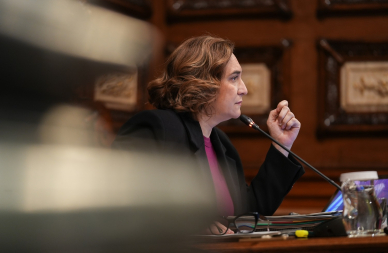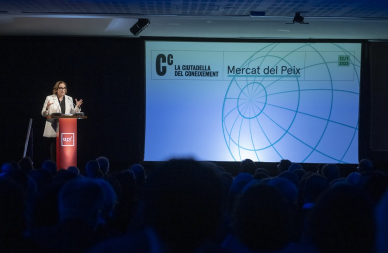24/02/2023
Get to know the Mayor better
Speech at the 37th Alfonso Comín Award
Share it
Speech of the day 15/12/2022
 Click to enlarge and watch the video
Click to enlarge and watch the video
Share it
"We need to say, loud and clear, that there can be no democracy without anti-fascism. This is understood by the world’s most consolidated democracies, which are clear about whom they should thank for their democratic heritage and whom they should not accept as part of their institutions."
A very good evening to you all.
Especially to Maria Lluïsa Oliveres and the entire Comín family, who are here with us this evening to celebrate the 37th edition of the Alfonso Comín International Awards, after a two-year absence as a result of the Covid-19 pandemic.
One member of the family who is not with us today is Pere, who sadly passed away this year. We will all deeply cherish his memory. Another absence is that of Toni Comín. Regardless of one’s political ideas, I think there is a broad, not to say unanimous consensus that he should be here with us this evening. I would therefore like to take this opportunity to call for an end to the exceptional circumstances that mean Toni is unable to attend, when he should be here to enjoy this occasion with us.
We are gathered here this evening to present an award which seeks to raise awareness of the struggle for human rights and democracy in all countries and under all circumstances.
And if I may, in line with the values that underpin this award and in response to the news that we have been reading in recent days, I would like to begin by expressing my absolute disgust, and indeed the shame I feel, due to the fact that the FIFA World Cup is being held in a dictatorship that does not respect human rights and which exploits its workers to such an extent that they are mistreated, killed or even enslaved.
Around 6,500 people are said to have died building the infrastructure for this World Cup. Global sporting events, such as Olympic Games or World Cups, must be collective celebrations in favour of democracy and human rights. Sadly, it cannot be said that this is the case on this occasion.
Qatar is a country in which women are mistreated and discriminated against. Amnesty International has labelled it the “World Cup of Shame”. This is also, in part, due to its persecution of people from the LGBTI community. I believe the fact that FIFA has threatened to punish footballers who had decided to wear the “One Love” armband to highlight their support for people’s right to love whoever they want, irrespective of our individual conditions or preferences, is particularly shameful. I feel that banning an armband which celebrates love contradicts a sporting celebration that should represent each and every one of us.
We therefore stand firm in our refusal, just as Paris and other French cities have done, to screen matches of this World Cup of Shame in public spaces. Because we regard public space as a democratic space for all citizens that should therefore represent our shared commitment to democracy and human rights.
As I was saying, the Alfonso Comín International Award is a prize awarded annually by the Alfonso Comín Foundation to raise awareness of unjust and cruel situations in which human rights are violated, and to give positive recognition to people or groups who are committed to making the world a fairer place.
Alfonso Comín was an example of this commitment to fight for a freer and fairer world. He never stood silent in the face of injustice and human rights violations, regardless of where they came from. He didn’t do so at any point during the regime of Francisco Franco, during which he was arrested eight times and imprisoned twice.
It is this spirit of commitment that the award bearing his name seeks to recognise. Just like him, many others fought against Francoism, to such an extent that it was impossible for the dictatorship to remain in place.
We have to remember that democracy was not something that arrived by inertia. It was not a gift or a natural process. Rather, it was a social conquest that required many, many sacrifices, and many lives were lost in the process.
These lives were cut short, as the book by David Ballester, who will talk to us later, reminds us. Cut short by a dictatorship that continued to kill as it died, and which unfortunately continued repressing its citizens for many years afterwards.
And what is even more outrageous, as David Ballester routinely says, is that you can count on the fingers of one hand the guilty parties who were tried and, with even fewer fingers, those who went to prison. This is what is known as impunity.
That is why it is so important for us to keep denouncing those events and to keep demanding truth, justice and reparation.
Here I would like to take this opportunity to pay homage to Hebe de Bonafini, a mother of the Plaza de Mayo, who has recently passed away. She was a phenomenal activist and exponent of those values of memory, truth, justice and reparation.
And that is why the initiative of the platform that will receive this award this evening, CEAQUA, which coordinates all the historical memory entities in Spain wishing to support the Argentinian lawsuit against the Franco regime’s crimes, is so valuable.
The decision of Argentine judge María Servini opened a window of hope for all those who have been fighting against impunity for so many years.
Indeed, we must also reiterate our gratitude for all those organisations which, together with relatives of the victims of Francoism, decided to go to court in search of justice.
Since then, the road has been paved with difficulties and obstacles. However, it remains very much alive thanks to organisations such as CEAQUA, which brings together more than 200 organisations, making it the most representative, sizeable and cross-cutting platform of organisations seeking justice for the victims of Franco’s regime.
Newer generations that have become aware of the price of history, and of the violent logic with which the modern reality has been constructed, have a duty to remember.
It is through remembering that the foundations can be laid for the reparation of what is owed to the victims, and for the victims and their families and loved ones to be recognised.
As Walter Benjamin said: “memory opens inquiries that the law considered closed”.
This is what Judge Servini’s lawsuit, and the actions of organisations such as yours, represent: an example of history that refuses to disappear, which neither repression nor decades of silence or contempt can silence.
It is essential that public institutions also assume responsibility for implementing a public policy of recovering democratic memory.
That is how we view things at Barcelona City Council. And that is why we started the previous term by creating the role of the Commissioner for Memory Programmes, and why we have promoted a genuine policy of recovering municipal democratic memory. I’m not going to roll off a list of the many things that we have done but allow me to highlight two of them:
-
One particularly impressed me. I requested that the names of the 1,700-odd people killed by firing squad in Barcelona be placed at the site of their execution by Franco’s forces. Almost 1,600 of these people were killed at Camp de la Bota, yet their names were nowhere to be seen. In 2019 we inaugurated the Camp de la Bota memorial, where there is now a 55-metre parapet bearing all the names of those executed by firing squad in Barcelona.
-
We also support the demands of all the associations that were present yesterday on Via Laietana demanding an anti-Francoist memory space that is worthy of our city. We agree that the Via Laietana police station should no longer serve as a functioning police station, but as a memorial, as there are in Argentina and in so many other countries. It is high time that the same was done here, in our country.
-
We have obviously participated in open cases, such as the one in Argentina against Francoism. Or against the fascist bombing of our city by the allied Italian air force during Franco’s dictatorship.
CEAQUA’s cause, therefore, is also our cause. And we agree that we need to bring an end to the current regime of impunity for Franco’s crimes.
In the last few years, we have seen how fascist and hate speech has grown again in Europe – in our country as well – to the point where exponents of these beliefs now occupy government posts.
And we need to say, loud and clear, that there can be no democracy without anti-fascism. This is understood by the world’s most consolidated democracies, which are clear about whom they should thank for their democratic heritage and whom they should not accept as part of their institutions.
Because our interest in remembering the past comes from nowhere else but the enormous hope and excitement we feel for the future, contributing to the civic, republican and democratic education of our sons and daughters.
As the philosopher Reyes Mate said: “The moral progress of humankind is measured by the present generation’s awareness of its responsibility for the past”.
Based on this feeling of responsibility, respect and absolute recognition of the past, we would like to publicly thank the Alfonso Comín Foundation and CEAQUA at this event which is forward-looking, optimistic and committed to freedom and democracy.

